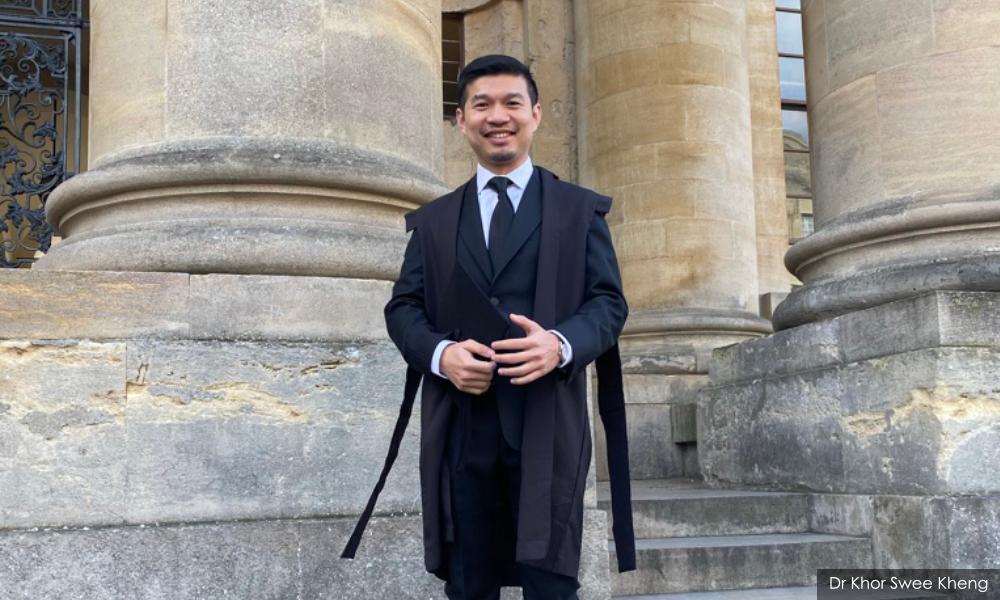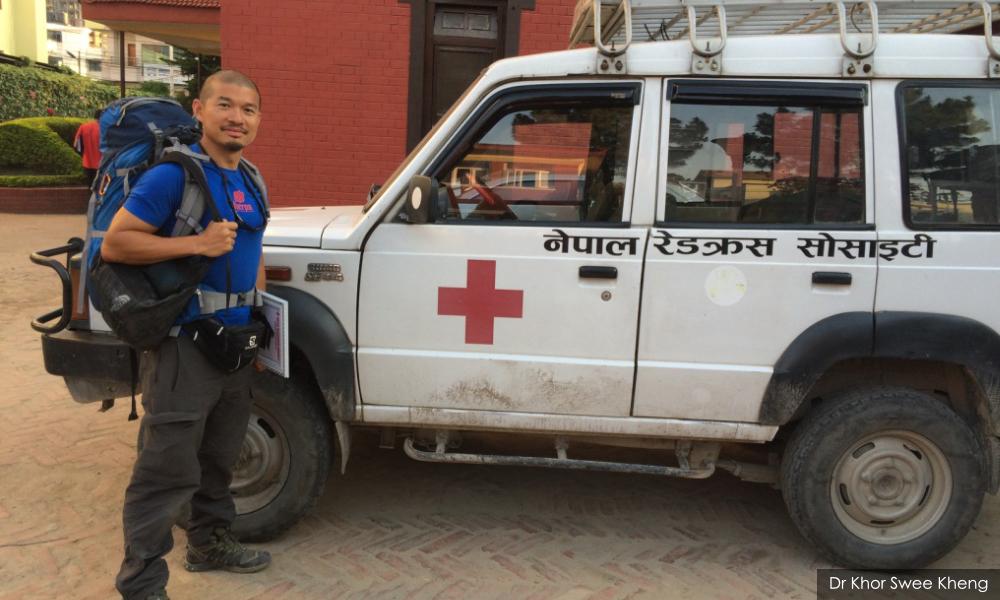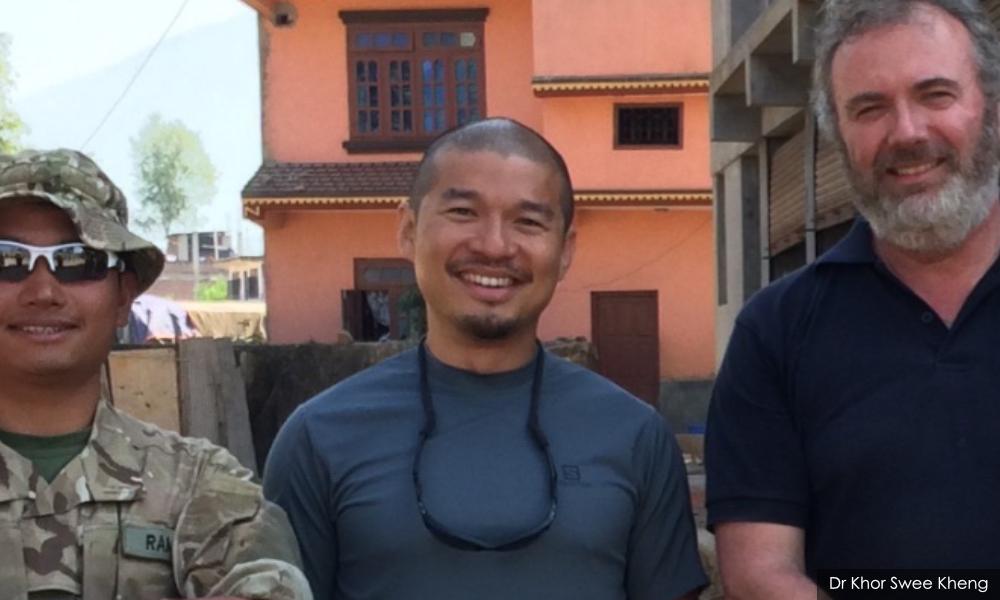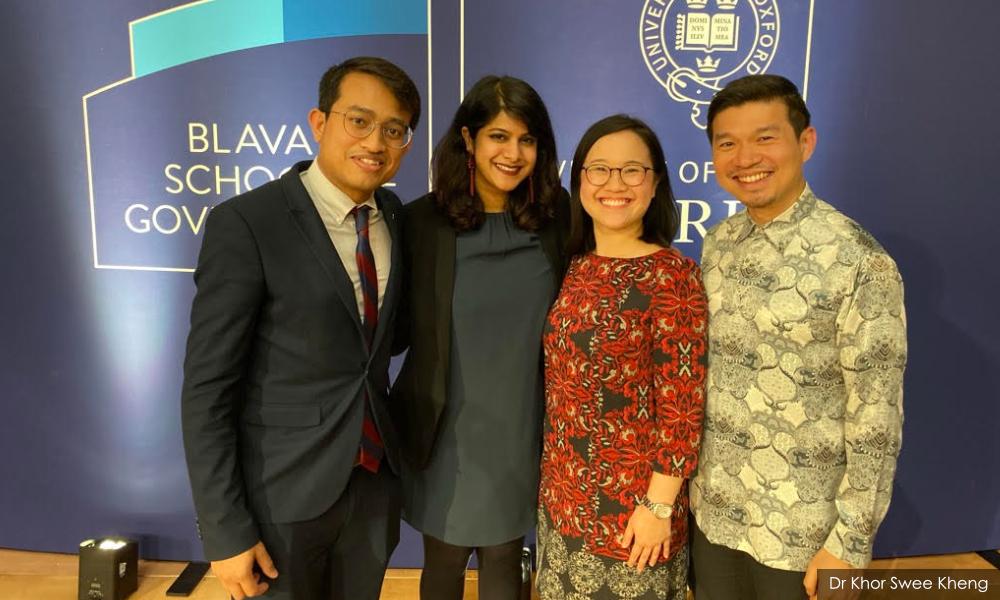When his father passed away in a tragic accident nearly two decades ago, Dr Khor Swee Kheng was just three months shy of his university graduation.
He remembered how his life changed from the impact of that loss.
“My father's passing from a traffic accident is the single largest influence on my life.
“His passing taught me that everything is impermanent, and it is a leader's responsibility to build institutions and systems that can survive the leader's departure,” Khor said.
That lesson stayed with him throughout his career from his days as a doctor at the Taiping Hospital to the times he held various senior positions at multinational pharmaceutical companies, and eventually co-founded the Malaysian Health Coalition (MHC), the first organisation to unite 48 health professional societies in the country.
The now public health expert and Malaysia’s first fellow at the Centre for Universal Health at Chatham House, Khor has always tried to carry the lesson he learned from his dad and turn it into building systems and institutions that last.
“Even till today, I still have my father's name tag which I use, and I remember this very clearly because he would wear it every day for years.
“It made me feel like I was a part of him, and also reminded me every day that I'm part of a civil service family," he told Malaysiakini through a Zoom interview.
Born and raised in Taiping, Perak, the triple degree holder in public health, public policy, and medicine recalled what his humble childhood was like.
“We grew up relatively poor in Taiping. My parents' civil service jobs paid enough to sustain us, but it was not enough for luxuries."
Khor’s father worked in the Veterinary Service Department, while his mother spent much of her career working for the Health Ministry.
“It was only years later that I realised my parents sacrificed a lot so that my sister and I never felt the feeling of relative poverty,” he added.

A hardworking student, Khor’s impressive academic results in secondary school earned him several offers from prestigious universities, including one to study law at the National University of Singapore.
But eventually, under his father’s encouragement, he decided to study medicine at Universiti Kebangsaan Malaysia.
His university years were characterised by two things, study and debate. In the latter field, he bagged a number of international awards with his team, including at the 2005 World Universities Debating Championship.
“Debating taught me a lot of important skills like communication, structure, and gave me an understanding of the importance of knowledge,” he said.
The flying doctor dream
Everything at university seemed to be going well for Khor, who like many of his age at the time was eager to travel and venture into the outside world.
“The original dream was to go to Sarawak to work in the interior, to join the flying doctor service, to just work in a place that I think is a beautiful state and had an important need for health care."
But his father’s passing changed everything and in wanting to stay closer with the rest of his family, Khor decided to settle for a job back in his hometown.
“That's when I started working with my mom in the same hospital. The senior nurses in the hospital had known my mom for a long time, so they don't call me Dr Khor you know.
“They call me anak Peong (Peong’s child). Tiong is my mother's name,” said Khor, recalling the good memories he had during his job at Taiping Hospital.
After four years and some contemplation, Khor eventually decided to move from his job in the medical field to pursue a different career.
“I left the medical field because, at that time, I wanted to do more in health, but I didn't know what I wanted to do.”
Khor believed that if he wanted to improve the health of a nation, he needed to understand the outside world beyond Malaysia, and beyond the public sector.
“So, it was a process of self-discovery, a process of seeing the world outside me, and thirdly, to understand the private sector.
“It's not enough to work in government service alone,” he added.
Various steps en route to public policy
So, Khor booked a flight to Singapore and went to work for a regional office of an American pharmaceutical company.
His career in the pharmaceuticals industry brought him a number of promotions and saw him move across the world from Singapore to Dubai, Shanghai, and eventually Paris.
“I came back to Malaysia to care for my mother for six months in 2018 during her chemotherapy,” Khor said of the time he received news that his mother had cancer.
It was during those months taking care of his mother that Khor found his calling.
“I never wanted to be in the private sector forever, and I wanted to come back to public service in whatever form that took place,” he said.
Khor summarised his life to this point, saying that he had received so much from the people around him and the world, so it was only natural now for him to give back.
“I feel very lucky and grateful, and these are very important feelings to me that translates into a deep sense of duty to serve my country and the world,” he added.

Coming back to Malaysia
After a decade-long career in the private sector, Khor decided it was time to put his experience into the field he’s most passionate about - public health service.
So, he gave up his high-paying job at the pharmaceutical company in Paris, and off he went to obtain a Master’s in Public Policies at Oxford.
He then returned to Malaysia, initially started working in think-tanks like the Penang Institute in 2019, and later Institute of Strategic and International Studies (Isis).
“The process of working in an American pharmaceutical company was also quite instructive to me, taught me a lot about the efficiencies of the private sector, modern management practices, as well as the importance of being effective with your time.”
He brought those qualities with him to his think-tank jobs, and together with the help of other health professionals, Khor co-founded the MHC in March last year, which was just as the Covid-19 pandemic was beginning its massive impact on the country.
“It was important for doctors, pharmacists, specialists, nurses, dentists, public health specialists, and allied health professionals to unite so that we can support the Health Ministry, improve and protect the health of the people. Those were the reasons why we founded MHC,” he said.
MHC has issued more than 45 public joint statements to date, aiming to provide feedback and recommendations on health policies to the government.
“These positions are the consensus between experts spanning a range of healthcare disciplines in Malaysia, hoping to influence government policies, and to act responsibly towards civil society,” Khor added.
Sensing a need for more public health messages to be disseminated, Khor and others set up a crisis communication team, one of the first tasks MHC undertook.

“It started with me putting up a Facebook post, looking for graphic designers and translators in Malay and English.
“I was looking for four people, but suddenly so many people volunteered, and it became 200, so we had to create an infrastructure to manage all that," he said.
Khor and his team decided to split the volunteers they recruited into different categories. Each of the teams was responsible for specific actions.
“The science team would hand off their work to the translator team, then they handed off to the graphic design team, that then handed it off to the media team, for them to perform this entire process,” Khor explained.
The crisis communication team grew to be so efficient that it eventually came up with 10 public health campaign products in 29 languages, all within 12 weeks.
A sense of purpose
Khor believed the project had given many of its volunteers a sense of purpose during the lockdown, and he is grateful for their contribution.
“During a long pandemic, we must make people feel useful, relevant, and powerful.
“They (the volunteers) felt powerful during the process, they felt relevant, they felt useful.
“Many of them were happy to do this. I mean I'm very grateful and very appreciative. I told them, they don't owe me anything, I owe them,” Khor said.
New leadership
When asked about his advice for the next government, now under the leadership of Prime Minister Ismail Sabri Yaakob and with Khairy Jamaluddin at the helm of the Health Ministry, Khor said that a fresh approach to existing suggestions and policies was what was needed.
“First, the best practices and suggested policies are already there, what's missing is the execution.
“Therefore, you do not have to come up with new strategies, new ideas or innovative solutions.
“You just have to effectively implement the existing suggestions and recommendations by experts within Malaysia, and look for the best practices from other countries,” he said.
He suggested that the government find competent professionals to fill the ministry positions, instead of relying on a small talent pool of 220 MPs.
“Thirdly and finally, is to have a robust federal, state and civil societies coordination.
“In other words, the federal government alone cannot pretend to have all the answers and solutions and implement them all by themselves,” he said.
Khor argued that all levels of government should come together, working with the private and civil societies sector together to bring Malaysia out of the pandemic.
“Ultimately, health is a political choice. We know what we need to do, the question right now is how do we do it.
“And (to answer that question) would often require political will,” Khor added.

Listen to voices on the ground
He recalled a phone conversation he had in November last year with a former colleague who was working in a public hospital in Sabah.
“My former colleague called to share the concern about the extremely volatile pandemic situation in Sabah.
“He works in the public hospital in Sabah and sent me pictures of overcrowded wards that spilled over into the corridors,” Khor said.
Khor believed his networks of friends, contacts, and former colleagues have kept him informed and guided him in his works of drafting health policy recommendations.
The same attitude of listening to what's happening on the ground should be the way policymakers are informed too, he said.
“Feedback from the ground is very important because policies cannot be made in an ivory tower in Putrajaya without understanding what the conditions on the ground are.
“Only if we truly understand conditions on the ground, without that news being filtered by little Napoleons, will senior policymakers in Putrajaya understand the actual situation.
“And then they can make policies that are relevant in real life, instead of relevant in theory only,” he added.
Khor also wished to share his long-term vision for the country’s health system, saying that if he was the health minister, there were three things he would do first.
“Number one, I would recapitalise the Health Ministry in financial, human capital and political capital terms,” he said.
Believing the Health Ministry should be protected from partisan politics, Khor said the ministry should receive all the resources and political capital to conduct its work.
“Second, I’ll spend half my time between the Health Ministry and the other half appropriately interacting with other ministries,” he said, emphasising a holistic healthcare approach where cooperation of other ministries is needed.
Finally, Khor said he would establish a Health Reform Commission which is accountable to Parliament.
“We need such a commission because health reforms usually take decades and we need an institution that can survive political transitions."
A post-Covid-19 world
He also reminded the public and policymakers alike that the post-Covid-19 world will not be a return to the old one.
“Number one, public health will become a permanent part of our social landscape, like masks and annual vaccination,” he predicted.
As more variants of the virus are surfacing, he believes many current measures to contain the virus will remain in place for the foreseeable future.
Next, he said, Covid-19 will become a permanent part of the policymaking landscape, influencing various policies from monetary and fiscal to welfare, labour, and education.
He foresees that the government will be forced to reform the healthcare system.
“They have no choice, they will be forced to reform their health system to prepare for an endemic Covid-19 and this reform of the health system cannot be postponed any more,” he added.
Khor predicted that in doing so, the government would still need to run the services at the same time, which is a challenging but necessary task.
“In the process of reforms, they will need to do surgeries while running a marathon,” he said. - Mkini



No comments:
Post a Comment
Note: Only a member of this blog may post a comment.